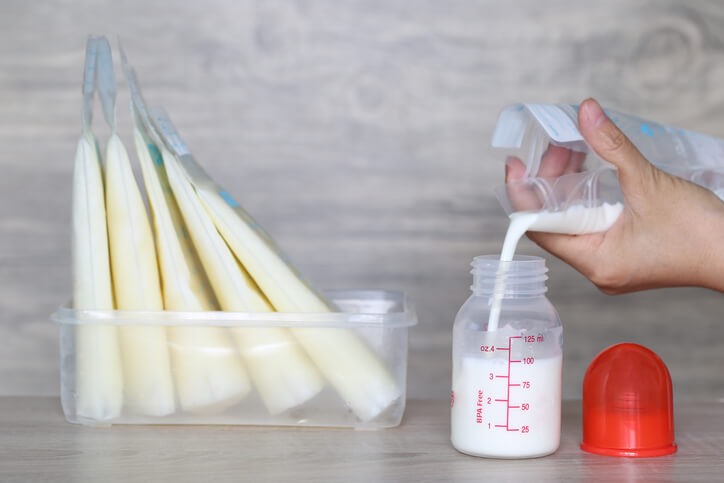Having a child via surrogacy doesn’t mean you have to miss out on all the experiences of pregnancy and childbearing. In fact, one of the most popular topics for intended parents is breastfeeding and breast milk.
That’s right — even if your child is born via surrogate, they can still reap the benefits of breast milk. Some intended parents accomplish this through inducing lactation, while others turn to donated breast milk.
In honor of August being National Breastfeeding Month, we’ve compiled this guide for intended parents. Below, learn more about what donated breast milk is, how it works and how you can safely procure some for your child.
Please note: None of the information in this article is intended to be or should be taken as medical advice. If you are interested in the advantages and disadvantages of donated breast milk, please speak to your pediatrician first.
How Does Donated Breast Milk Work?
While breastfeeding can be difficult for many women, just as many women find themselves with milk to spare. After pumping more milk than their babies can eat, these women choose to donate their milk to those infants in need — typically, premature or sick infants who are in the NICU until they are strong enough to go home.
Women who donate breast milk must go through several screening steps prior to being accepted by a milk bank. This ensures that she is healthy and that her breast milk is of a high-enough quality to be donating. After her milk is received by the bank, it is screened, tested and pasteurized before being distributed to parents in need.
Where Can I Get Donated Breast Milk?
There are two paths to obtaining donated breast milk: formally and informally. The safest path is the former; if your child is eligible for donated breast milk in the hospital, your doctor will explain the protocols and requirements.
Most hospitals reserve donated breast milk for those infants in most need of it (those with special medical conditions). However, some may have a supply of “compassionate use” breast milk, reserved for those mothers who cannot adequately feed their babies on their own but aren’t high on the priority list.
You might also purchase breast milk from milk banks, like Medolac, Prolacta and the International Milk Bank. In order to buy from either a non-profit or for-profit milk bank, you’ll need to get a prescription from your doctor. And, like with hospital supplies, milk bank supplies are on a needs-based system; those with sick or premature infants are higher on the list than those parents with healthy babies.
Why is Informal Milk Sharing a Bad Idea?
In your search for donated milk, you may come across communities or collectives of mothers sharing breast milk. Because these sources are not licensed or regulated, you don’t need a prescription to purchase the breast milk — but you open yourself up to many risks.
Unlike breast milk donated through official banks and hospitals, milk obtained through informal sharing is often not screened or tested. There is no quality control, which means there are no standards for milk being shared. Sometimes, those selling milk mix their supply with cow’s milk or other sources without telling the buyer.
Both the American Academy of Pediatrics and the Food and Drug Administration advise against informal milk sharing. While the benefits of breast milk can be tempting, it’s not worth the risk of obtaining through unregulated means.
What are My Options for a Child Born Via Surrogacy?
If you are having a child via surrogacy, the first thing you should do is talk to your pediatrician. They can explain your options for feeding your child after they are born, as well as the differences between formula-feeding and breastmilk-feeding.
If you strongly believe in feeding your child breast milk, talk to your hospital about the options for donated breast milk. Remember that healthy infants are at the bottom of the waiting list, so be prepared to feed your child formula when breast milk is not available. If you are ready for the commitment and can plan far enough in advance, you might consider inducing lactation to breastfeed your child yourself.
Keep in mind that many parents feed their children formula. Some mothers have a difficult time producing enough milk for their children, while others don’t have the time to commit to long-term breastfeeding. Formula-feeding does not mean you’re a bad parent, and it does not mean that you’ve failed your child in any way. While there are proven benefits of breast milk, children fed formula are just as healthy. They are many great alternatives to breast milk out there, so talk to your pediatrician for suggestions and advice.









